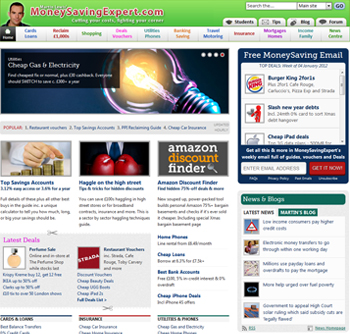 To speedily slash home insurance costs, combine comparison sites to boost the number of quotes, then get cashback too. This powerful technique's seen MoneySavers earn more cashback than the policy costs - the record result's a £67 PROFIT to take out the cover!
To speedily slash home insurance costs, combine comparison sites to boost the number of quotes, then get cashback too. This powerful technique's seen MoneySavers earn more cashback than the policy costs - the record result's a £67 PROFIT to take out the cover!
These savings can be had anytime. Provided you haven't claimed, most insurers allow policies to be cancelled with a refund, and while a few charge, you're still likely to save more than they cost.
In this guide
Quick Links
Step 1: Ensure your cover's correct
Insurance premiums, the name for payments made to insurance companies, depend on the insurer, the level of cover and how risky you're perceived to be. Therefore start by defining your cover and ensuring you're as low a risk as possible.
Full information on this, including the difference between buildings and contents cover and how to lower the risk category you are in, are in the special additional extra tips to cut your home insurance premiums article.
Plus, if you've not got 'normal' circumstances eg, you've made a claim in the past few years, are in an area prone to flooding or subsidence, do ensure you tell the insurer. If you don't and then try to claim, even for an unrelated issue, your whole policy may be invalid. With insurance the golden rule is to 'tell them the whole truth and nothing but the truth'.
Beware monthly payment plans
Beware 'pay monthly' options - usually the insurer actually just loans you the annual cost and then charges interest at hideous rates on top. So either pay for it in full, or if you can't afford it, use a credit card with a lower APR rate (or better a 0% credit card for spending ensuring your repayments are big enough to clear it within a year).
What to cover?
 A common mistake is to cover the house's market value (the amount it could be sold for), meaning many people are over insured and paying way too much.
A common mistake is to cover the house's market value (the amount it could be sold for), meaning many people are over insured and paying way too much.
Actually, the amount you cover (again called the 'sum insured') should be the 'rebuild value'; simply the cost of rebuilding the property if it were knocked down. Therefore location is less important than the value of materials, labour and architects' fees. However it's important that any building policy covers the cost of an alternative residence for you if your home were being rebuilt.
Commissioning a survey is the most reliable method to establish the rebuild value, but will be expensive unless you're getting one anyway when buying a new home. A less accurate, but quicker, option is ABI's calculator, using one of the comparison websites that incorporate the ABI's data - our top pick below Gocompare* does this - or simply asking an insurer to give you a rough value based on standard assumptions.
Plus for contents, ensure you don't under-insure. Add everything up, including smaller items such as clothes. If, for example, you request £20,000 of cover when you actually have £40,000 worth and have to make a claim, you will only get a proportionate payout, ie 50%, or worse still, the policy cancelled for being severely underinsured. If the latter happens, this then causes a knock on affect of having to disclose the fact that you have had insurance cancelled.
Step 2: Correctly combine comparison sites
Comparison sites zip your details to hosts of insurers' and brokers' websites, scraping their data off the screens to report back the cheapest. So be aware they often feed your personal details to insurers (see What insurers may do).
Yet these screenscrapers don't all compare the same sites, so the best strategy's to combine them. We've analysed the comparison sites to produce an order that gets you the max. quotes in the min. time (see How the order is picked).
Compare in the following order:
1. GoCompare51% of the full combined search in 10 mins
-
Pros: GoCompare's system allows you to compare and customise your quote results to get the best policy for your needs (eg if you want legal cover or accidental damage included) and it's easy to edit, change or rerun your details at a later date if needed.
Cons: If you don't want it to contact you afterwards be careful - there's a link on the last page ('please click here for more information') you need click and tick to stop it getting in touch again.
- Average quotes returned: 73
- Add feedback: GoCompare Home Ins
2. MoneysupermarketAdds another 11% to combined search
-
Pros: There's a few nice features, such as a predictive occupation search and contents cover calculator. You can also change your excess level (see below) on the results page
-
Cons: The excess may be editable but it does start at a high default of £250. Plus if you don't want to be contacted ensure you untick the boxes in 'getting back your quotes' at the end of page 4.
- Average quotes returned: 62
- Add feedback: MoneySupermarket
3. ComparethemarketAdds another 6% to combined search
-
Pros: This is a smaller comparison site but adds a good number of additional providers in order to increase your number of quotes.
-
Cons:The quotes on the results page show the voluntary, rather than total, policy excess so double check the total is ok for your needs. The marketing follow up is hidden away at the end of the 'Your Details' page, so check if you're happy with the terms and tick to opt out if not.
- Average quotes returned: 49
- Add feedback: Comparethemarket
4. ConfusedAdds another 5% to combined search
-
Pros: There are a few nice features such as quickly changing your excess or need for accidental cover on the results page and being able to estimate your rebuild value, yet don't automatically assume the suggested value is correct if you're not sure.
-
Cons: You are likely to get follow up phone calls and emails as there is no overall marketing opt out.
- Average quotes returned: 50
- Add feedback: Confused home ins
Total...
100% of total search.
Adds...
12 Brokers, 2 main insurers
5. All the restAdds 39 providers, rounding search up to 100%
If you still haven't found a deal you're happy with or want to push the envelope there are many more options to try.
Two competitive insurers, Direct Line* and Aviva*, refuse to be included by comparison sites so it's worth checking them separately.
These other comparison sites between them will add more than thirty further providers; Beatthatquote*, QuoteZone*, uSwitch* and Tesco Compare*. Though there are more standalone insurers out there.
This order is based on a full survey carried out roughly every three months, last done in Dec 2010
Once you've found the cheapest
Once you've found the cheapest from the screenscrapers; there are two important checks to make:
Double check the quotes.
Click through to the insurance provider's own website to double check the quotes, as to speed up searches some comparison sites make a few assumptions (see What to check).
-
Examine the policy's coverage.
Check whether it's suitable. So if you want "accidental damage", is it included? And if you specified you were in an area affected by flooding or subsidence is this noted?
Plus while you're there it's worth playing with the policy details to see if you can finesse the price down; look at the excess, and the name of the policy holder (if a joint policy) as the age of each person can affect your quote (see extra tricks article). This tool by Find* allows you to check the coverage of two different buildings* and contents* policies side by side.
Screenscraper and broker differences
Brokers and screenscrapers may seem like they're doing a similar job, as each search a number of different insurers; yet they're radically different beasts. My favourite analogy for this is to compare it to searching for the cheapest loaf of bread.
Individual insurers are like bakers, your choice is simply to buy its cheapest loaf that suits. Brokers are like supermarkets; they stock a range of bakers' loaves and the price charged depends on their relationships with suppliers. Screenscrapers are like sending someone round supermarkets and bakers to note all their prices.
 What if my insurer goes bust?
What if my insurer goes bust?
Comparison sites include many providers, the vast majority of which are regulated. A small number aren't, for example Markerstudy which is regulated in Gibraltar (meaning you'll need to claim from there if it's your insurer and it goes bust), so it's always worth checking yourself if you're concerned.
In the unlikely event a regulated insurer goes bust, the FSCS will try and find another provider to take over or issue a substitute policy. However, if you've ongoing claims, or need to claim before a new insurer is found, the FSCS should ensure you're covered. For more see the Insurance section of the Savings Safety guide.
Further tricks to find a cheaper price
If the comparison sites haven't saved you money or given the cover you need there are some alternatives:
High value possessions
If you have several high value possessions Hiscox* may be worth a check.
-
Guarantee to beat your renewal
Several providers have price guarantees if you've not beaten your renewal quote:
Quoteline Direct: Broker Quoteline Direct* promises to beat your price by at least 10% with similar cover.
Uswitch: uSwitch* also offers to beat your renewal (via insurer Brit), for cover on a like for like basis, by at least 10%, providing your annual premium is over £100. If its online comparison doesn't give you a cheaper price call 0800 123 700.
-
If you've not got 'normal' circumstances
Some groups, eg, those in areas prone to flooding, subsidence or whose house is left unoccupied for long periods, can find it incredibly difficult to find cheap insurance cover as they are considered too high a risk. See the Home Insurance Tricks guide for further ways to reduce your risk or try speaking to a local broker (search on the British Insurance Brokers' Association website) about your individual circumstances.
Don't miss new insurance deals & updatesGet MoneySavingExpert's free, spam-free weekly email full of guides & loopholes
Step 3: Grab Hidden Cashback and Haggle
By now you'll know the cheapest available provider, yet you may be able to cut the cost even further.
The top cashback deals
Once you've know who your cheapest provider is... then you need to check there aren't any hidden cashback deals, these can be as high as £120. If your second or third cheapest quotes weren't much more expensive then see if cashback is available for them too, and find the overall winner.
The step-by-step list below takes you through a variety of options to improve your deal.
Check 1: Check cashback websites
These sites carry paid links from some retailers and financial services providers; in other words if you click through them and get a product they get paid. They then give you some of this cash which means you get the same product, but a cut of its revenue.
Don't choose based only on cashback, see it as a bonus once you've picked the right cover...
Those new to cashback sites should ensure they read the Top Cashback Sites guide for pros and cons before using them. Otherwise use the Cashback Sites Maximiser tool to find the highest payer for each insurer.
Things you need to know before doing this...
Never count the cash as yours until it's in your bank account. This cashback is never 100% guaranteed, there can be issues with tracking and allocating the payment, plus many cashback sites are small companies with limited backing, and you've no protection if anything happens to them.
Withdraw the cashback as soon as you're allowed. Money held in your cashback site account has no protection at all if that company went bust, so always withdraw it as soon as you're eligible.
-
Clear your cookies. While it shouldn't be a problem, if you've used comparison sites beforehand, there is a minor risk that the cashback may not track due to cookies - so it's good practice to clear those first (read AboutCookies).
Check 2: Check special deals
If you can't get cashback it's worth noting a few companies have special deals not mentioned by comparison services. These currently include (listed alphabetically):

New customers buying Aviva* buildings and/or contents insurance, and can prove at least 5 years no claims on their existing policy, can save 50% when buying online. |

Barclays* is offering new customers half price contents cover until 1 July 2012. Plus there's an extra 10% off when buying combined buildings and contents cover. And another 19-30% (depending on your details) when buying online. Quotes are valid for 90 days. |

If you have not claimed for five years, Churchill* is offering 50% off buildings and/or contents cover until 31 Mar 2012 and if you buy the cover online, there is an extra 20% off. Quotes are valid for 90 days. |

Buy buildings and contents together from the Co-operative*, you'll get a 1/3 off your contents premium and free Legal Expenses. |

Buy via the Confused partner site on Nectar and you'll get 1000 points (worth £5). |

Get 30% off contents and/or buildings insurance from Direct Line* until 29 Feb 2012, plus a 20% discount if you buy online. Minimum premiums apply. |

Buy a contents, buildings, or combined insurance policy from Hastings Direct* and get free access to its Will writing service. |

Halifax* says it will give £50 if you take out its contents and buildings insurance online or by phone. |

Lloyds* is offering new customers £50 Cashback when buying combined buildings and contents 'options' insurance online, plus a 15% online discount. If you are an Internet Banking Customer, this increases to £60. |

More than* is giving up to £75,000 free contents cover to those buying its buildings insurance. The free contents continues as long as you don't make a claim so it remains free if you renew at the end of the year. |

Buy buildings and contents cover from Nationwide and you can get 90 days worth of free for new customers buying online. FlexAccount customers get 135 days worth of free cover which can be purchased online, by phone or in branch. Plus, until further notice, you can pay monthly at no extra cost. |

Natwest* is offering 20% off joint buildings & contents insurance, with an extra 20% off online when you enter the code '20OFF' on the 'Your Details' page - a total 36% discount. You can pay also pay monthly at no extra cost. |

New Sainsbury's* customers buying combined buildings and contents insurance online (exluding landlord cover) get a £30 Sainsbury's voucher, plus an extra 5% online discount and 15% off for combined buildings and contents cover. You must be a Nectar card holder to get the shopping voucher. |

If you buy combined contents and buildings home insurance from Swinton*, and enter the code HMWTDR648, before 31 Dec 2012, you'll get £30 cashback. |

New customers who buy cover from Tesco home insurance can get a 30% introductory discount in their first year, increased to 50% for those with five years no claims. There's also a discount for Clubcard holders although the amount is unknown. |
Haggle
The home insurance market is very competitive and companies are desperate to retain business. Therefore once you've got your overall cheapest price get on the phone and try to haggle. There's often massive price flexibility, but be fully armed with the screenscraper's cheapest quotes and any available cashback first.
The first port of call should be your existing insurer, after all if it can beat or even match the best quote it saves the hassle of switching policy. If that doesn't work and you're still in the mood, take it to a broker. For more haggling hints and tips read the full Haggle On The High Street guide.
Step 4: Remember next year

Apply for cover from your existing insurer as a new customer and it's likely you'll be given a cheaper price. This is because home insurers like any company will happily profit from apathy if they can. Insurers must send out renewal notifications at least 28 days before renewal, though this doesn't leave much time and you can end up rushing to try and find a cheaper price.
To avoid being forced to decide quickly, diarise a warning six weeks before your renewal date, so there's plenty of time to sort out a new provider. Alternatively use the free Tart Alert which sends a reminder text or email.
Get paid to be a mystery shopper
You could also sign up to Consumer Intelligence, a consumer research company, who pays several hundred people a month near renewal, up to £50 to carry out comparisons and importantly you do not need to buy insurance from any of the companies you've contacted. See the It's a Mystery forum thread for full details.
The current record result
This technique's so powerful, some people get more cashback than policy's costs, effectively meaning they were paid to take out the cover! The current record is held by MoneySaver Saving4Jesus.

The Record... PAID £67.50 for a year's cover
Quote of £52.50. By using the comparison services he found a quote for £52.50.
Cashback of £120. That same insurer was paying a mammoth £120 cashback. The important thing is, the cashback tends to be fixed whether your quote is for £77 or £864 as it's all about insurer's marking budgets not price.
Thus he was £67.50 up. Therefore for a years home insurance he actually made £67.50.
Quite a few MoneySavers have reported being paid to get policies already, if it happens to you, or you get a mammoth deal please report super cheap deals.
If you found that quick and easy
The Car Insurance cost cutting article works in exactly the same way and could save you another wedge of cash. Don't forget to check that out too.

 try it*
try it*
 try it*
try it*
 try it*
try it*
























